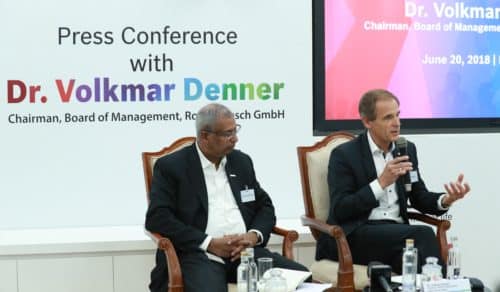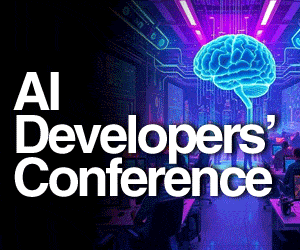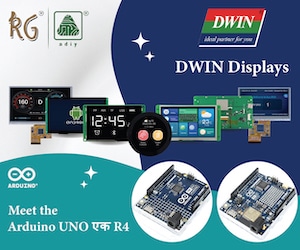At the press conference in Bengaluru on June 20th, the CEO and chairman of Bosch group, Mr. Volkmar Denner brief the developments and the roadmap ahead for various fields like the internet of things (IoT), artificial intelligence (AI), electric vehicles (EV) and connected mobility that Bosch is working on. Following are few excerpts covered by Ankita KS from EFY from the conference.
According to the latest global data, India has overtaken Germany to become the fourth largest automotive market in the world. To secure a leading position, automotive companies around the world are aggressively enhancing their innovation and research & developments (R&D) efforts to meet the rising demands of customers. Bosch India is one of those companies who is already started working towards better automation, electrification, and connectivity to continue leading the Indian market.

IoT and Artificial Intelligence
Last year Bosch had set up a state-of-the-art artificial intelligence center in Bengaluru and have added new teams to drive forward the development of solutions for the internet of things (IoT), which are tailored to local needs. With this, Bosch is planning on building a strong IoT base in India and is investing an additional 17000 million rupees in India in total in the coming three years.
Bosch has established the Bosch Center for Artificial intelligence (BCAI) across three continents, representing an investment of 300 million euros, out of which one Centre is in Bengaluru, India.
“In the future, artificial intelligence will be a key component of Bosch products. All our products will either possess that intelligence themselves, or AI will have played a key role in their development or manufacture. At Bosch, we apply AI to optimize processes in manufacturing, engineering, and supply chain management, and to enable intelligent services. “, says Dr. Volkmar Denner.
In India, Bosch has also recently set up the Robert Bosch Center for Data Science and AI at IIT Madras with annual funding of 4 crores (0.5 million euros) for the next five years. This center will set a precedent in the way big data is used to improve problem-solving capabilities in the industrial domain.
Smart Manufacturing or Industry 4.0
With IoT solutions for the factories and cities, Bosch is supporting the Indian government’s “Make in India” and “Smart Cities” initiatives.
Bosch has also partnered with the CII, the Confederation of Indian Industry’s Industry 4.0 Council, to create the “Smart Advanced Manufacturing and Rapid Transformation Hub” as a national action plan. This involves government support for small and medium enterprises as well as industrial bodies with smart manufacturing policies.
Apart from this Bosch has an Industry 4.0 Academy also offers top-down training to senior executives. To date, it has trained around 250 people. Now it is open to external participants as well, the Industry 4.0 Academy forms an integral part of the Bosch Production System philosophy which is based on the concept of “lean manufacturing.”
“From customer experience in retail environments to predictive maintenance for vehicles and machinery, intelligent parking management, automated driving, air pollution monitoring, and disease risk prediction for crops, we’re supplying the foundation for new value-added services and solutions in many different areas of application”, says Dr. Denner.
This 66-year-old company has 18 manufacturing sites and seven development and application centers across the country. Bosch has 31,000 employees, including 18,000 research and development associates.
Bosch is already well positioned in the IoT ecosystem with sensors, software, and services. By combining these with AI, they are gearing up to create unique value propositions in AI and IoT by investing additional 600 crores for expansion of Adugodi campus in Bangalore.
As India plans to achieve BS-VI implementation from April 2020 and adopt electromobility solutions built for Indian conditions. The company believes that the ICE (Internal Combustion Engine) will continue to be the mainstream solution for freight and commercial vehicles. Keeping in mind the country’s climate change targets, Bosch views the co-existence of fossil fuel engines and electrification with hybridization as an interim solution.
Automotive Sector
When it comes to automotive, to make low emissions traffic reality, the company is making investments – both in making electromobility a market success and in enhancing the combustion engine. Both technologies benefit the demand of the Indian market. Bosch engineers have succeeded in getting NOx emissions massively down. On average, test vehicles equipped with the enhanced technology already emit no more than 13 milligrams of NOx per kilometer during road tests according to the new European RDE standard. “There’s a future for diesel. It will remain integral to tomorrow’s mobility solutions”, says Volkmar Denner
Connected Mobility
Connected mobility is another field of growth in India. Bosch continues to drive forward its transformation into a provider of mobility services. The company recently established a Connected Mobility Solutions division to develop and sell digital mobility services. “Connectivity will fundamentally change how we get from A to B, and in the process, it will help to solve today’s traffic problems. We are using it to realize our vision of emissions-free, stress-free, and accident-free mobility,” said Volkmar Denner.
Overall, these new initiatives and investment do bring out the potential of the Indian market and that the developments we can expect in the coming few years.







